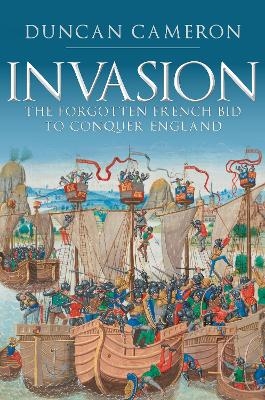
Invasion
The Forgotten French Bid to Conquer England
Seiten
2022
Amberley Publishing (Verlag)
978-1-3981-1244-5 (ISBN)
Amberley Publishing (Verlag)
978-1-3981-1244-5 (ISBN)
New in paperback - This is the untold story of the Second French invasion of England - 300 years after Hastings - an episode that time forgot.
The Norman Conquest in the eleventh century is one of the best-known events in English history, but the French attempts to invade England three hundred years later are largely ignored and misunderstood. In fact, French invaders landed on English soil more than fifty times during the fourteenth century, sometimes accompanied by allies from Castile, Monaco, Genoa and Scotland. Each incursion was part of an overall strategy led by the French monarch of the time, and those participating were well-trained fighters and shipmen. They were certainly not pirates, which is how they have often been described. The incursions were brutal, involving murder of civilians and rapine. Those along the invasion front responded and fought back, often surprisingly effectively. Determined English locals, organised into well-trained posses, sometimes bested the Continental professional fighters; although the economic damage caused by the raids was long-term.
In the later years of the century Charles the Wise and his great admiral Jean de Vienne made ambitious plans for full-scale conquest. The initial plans for the invasion were made at a time when France was engulfed by multiple crises, of which England was a prime cause. Whole forests of ancient trees were felled in the Seine Valley to build the fleet. Edward III and his son Richard II never were dislodged from the throne of England by the Valois – but the threat was real.
The fourteenth-century French invasion of England was not a single overwhelming event – such as Napoleon’s invasion of Russia – but a long-lasting process, sometimes intensely violent, which led to important changes to English society and had a profound and lasting impact upon the areas along the invasion front. This is the Anglo-French conflict that time forgot.
The Norman Conquest in the eleventh century is one of the best-known events in English history, but the French attempts to invade England three hundred years later are largely ignored and misunderstood. In fact, French invaders landed on English soil more than fifty times during the fourteenth century, sometimes accompanied by allies from Castile, Monaco, Genoa and Scotland. Each incursion was part of an overall strategy led by the French monarch of the time, and those participating were well-trained fighters and shipmen. They were certainly not pirates, which is how they have often been described. The incursions were brutal, involving murder of civilians and rapine. Those along the invasion front responded and fought back, often surprisingly effectively. Determined English locals, organised into well-trained posses, sometimes bested the Continental professional fighters; although the economic damage caused by the raids was long-term.
In the later years of the century Charles the Wise and his great admiral Jean de Vienne made ambitious plans for full-scale conquest. The initial plans for the invasion were made at a time when France was engulfed by multiple crises, of which England was a prime cause. Whole forests of ancient trees were felled in the Seine Valley to build the fleet. Edward III and his son Richard II never were dislodged from the throne of England by the Valois – but the threat was real.
The fourteenth-century French invasion of England was not a single overwhelming event – such as Napoleon’s invasion of Russia – but a long-lasting process, sometimes intensely violent, which led to important changes to English society and had a profound and lasting impact upon the areas along the invasion front. This is the Anglo-French conflict that time forgot.
Duncan Cameron taught the History of Art before working for the British Council in the Middle East and South America. He has been a regular contributor of analysis to publications on international business and Bloomsbury published his most recent work. In recent years Duncan has also engaged in heritage work in Brighton and saved two buildings from destruction by developers by winning them Grade II listing building status. The study of fourteenth-century history has been a lifelong passion.
| Erscheinungsdatum | 15.09.2022 |
|---|---|
| Zusatzinfo | 16 Plates, color |
| Verlagsort | Chalford |
| Sprache | englisch |
| Maße | 129 x 198 mm |
| Gewicht | 233 g |
| Themenwelt | Geschichte ► Allgemeine Geschichte ► Mittelalter |
| ISBN-10 | 1-3981-1244-5 / 1398112445 |
| ISBN-13 | 978-1-3981-1244-5 / 9781398112445 |
| Zustand | Neuware |
| Haben Sie eine Frage zum Produkt? |
Mehr entdecken
aus dem Bereich
aus dem Bereich
eine neue Geschichte des Mittelalters
Buch | Hardcover (2023)
C.H.Beck (Verlag)
CHF 53,20


